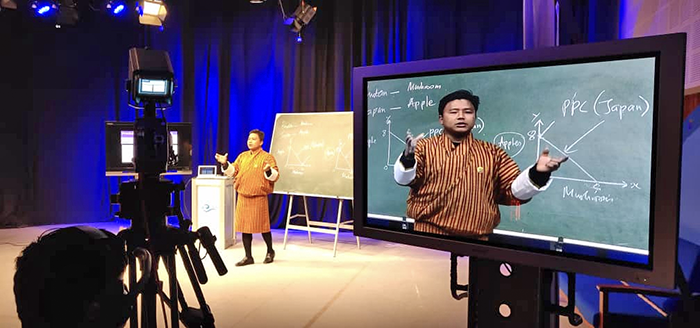Jigme Wangchuk
The lesson of the day is “comparative advantage”. What is it? Simply put, it is an economy’s ability to produce goods and services at a lower opportunity cost than that of trading partners. In other words, a comparative advantage gives producer or a company the ability to sell goods and services at a lower price than their competitors and so realise bigger sales margins.
Jamyang Tshulthrim, an Economics teacher of Chukha Central School, is delivering the lesson for the key stages four and five—for classes nine to twelve. The delivery of the lesson, however, is not happening in a classroom. It is in one of the studios of Bhutan Broadcasting Service Corporation (BBSC).
Bhutan and Japan both produce apples but, if Japan can do so at a lower cost than Bhutan, Bhutan had better look at producing something elsewhere it can do at a cheaper rate. That’s Jamyang Tshulthrim trying to bring the meaning of comparative advantage home to the students.
The Ministry of Education has begun an initiative to educate children through television challenges because schools have closed due to Covid-19 scare. The programme that was supposed to begin yesterday will be launched today. But broadcasting the lessons will start only from March 27.
Running a school system this, of course, comes with challenges myriad.
A good number of households, especially in the rural parts of the country, do not have a television receiver or set. A large number of students could, therefore, miss the lessons. There are other impediments also.
Two BBSC studios began recording the lessons from Sunday last after a two-day trial.
Only about 40 thematic lessons have been recorded so far. Editing them before broadcast could take some time.
There are six studios in Thimphu recording the lessons for all the key stages up to Class 12—three in Motithang Higher Secondary School, which has been turned into Education in Emergency Centre, one in iBEST Institute, and two in BBSC.
Then there is an online group called VTOB or Teachers of Bhutan Volunteers. But then, teachers coming forward to record lesson in the studios have been few and far between.
The Education Ministry is having to call teachers from the dzongkhags to come to the studio to record the lessons.
Tashi Dorji, general manager of BBS 2, said that stocking the episodes was the major challenge. Some teachers do not come on time to record the lessons. Many become nervous and retakes eat the time.
Wangpo Tenzin of the Royal Education Council (REC) said that the REC had outlined the thematic urgency clearly. If at all, the problem might arise from recording the lessons and broadcast time, he added.
BBSC is also buying Bhutanese films to keep the people at home. At this time, when the virus scare is raging, social distancing is critically important. However, BBSC has been able to procure only three Bhutanese files.
Chik-thuen is coming too.
This is an effort by actors and musician to help keep people at home. There will be programmes—songs and dances, among others. The programme will begin from today.


